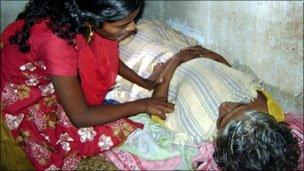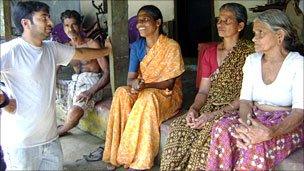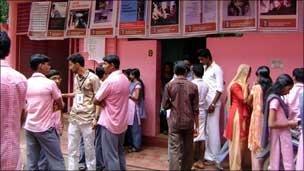Bringing hope to elderly and terminally ill Indians
- Published

Tirumala is looked after by volunteers
Inside a long, poorly lit room several old men are lying on a row of bunk beds.
Many of them are so old they have to be carried out to the lunch room, where they are served a frugal meal of rice, lentils and vegetables.
This is a shelter run by Mother Teresa's Missionaries of Charity in the Indian capital, Delhi.
The men have been abandoned by their families, who can no longer support them financially, and so are dropped off here.
Among them is Hira Lal, who has not got much time to live.
"My two sons brought me here - I've become so old and sick that they can't look after me anymore. I would have preferred to die at home with my family - but it's God's will that I spend my last days here," he says.
The nuns at the shelter tell me his family has never been back to see him. It's the case with almost everyone here.
It's also a situation that most of India's elderly are being increasingly forced to confront.
Pain and suffering
Only the rich or privileged have access to proper health care - the rest are increasingly forced to battle alone.
But 2,000km (1,242 miles) away, in Kerala, there is a ray of hope.
At the Institute of Palliative Medicine in Calicut, Dr Suresh Kumar checks on a patient, a poor fisherman who is suffering from lung cancer.
Moved by the pain and suffering of terminally ill patients, the doctor gave up his job as an anaesthetist to set up a ground-breaking palliative care system that has now spread across the state.
"Most of the problems faced by elderly people are not medical. A lot of the issues are social, emotional, issues of loneliness and a lack of money," he explains.
"Since it's not practical or even ideal for many of the patients to come to a medical facility, the idea is to go to them."

Mohammad Yunus spends most of his time organising the palliative care programme
It is particularly necessary, he adds, because most Indians prefer to stay at home with their families in the final stages of their lives.
Just outside Calicut is the village of Nadery - lush green coconut trees surround the small, mud huts where most residents live.
One of them belongs to Tirumala, who is terminally ill.
She is lying on a bed laid out on the floor. Painfully thin, she moans occasionally and her back is covered with bed sores.
Today she is being visited by a group of volunteers - all college students.
They carefully tend to her, cleaning her wounds. She is too weak to go to hospital so this is the only kind of treatment she can receive.
The head of the group of volunteers is Mohammad Yunus, a management graduate who spends most of his time organising the palliative care programme.
"We are taking care of 1,330 patients and we have 500 dedicated volunteers, all from college campuses," he says.
"We have a strong presence in every village and the moment a person registers with us, our volunteers pay a visit within 24 hours."
Model
Apart from offering medical attention, the focus is on involving the community - the family or, if there is not one, the neighbourhood.

Fundraiser at the local college
"Since most people find it difficult to cope, financially or emotionally, with a terminally ill patient, it's important that we train them and also support them," Mr Yunus says.
Their operations run round the clock and the service is free - funded entirely by voluntary donations from ordinary members of the community - students, pensioners, businessmen and even the police.
As Dr Kumar says, the involvement of the community is critical to the programme's success.
"We're trying to build a safety net around the patient enabling the family to look after the patient and also offering medical support from our side," he says.
It is a model that many believe can - and should - be emulated elsewhere.
But Kerala has high literacy rates and a strong sense of community - a natural advantage over other parts of India where the vast majority of the country's elderly still find themselves cast out and forgotten as they near the end of their lives.